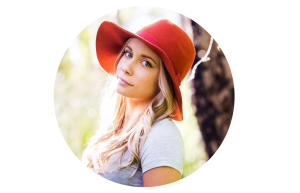[vc_row][vc_column][vc_column_text][printfriendly]
By Carolyn Digby and Jaime Maguire
Recovery from an eating disorder takes time, practice, and the compassionate support of others. Whether or not we have personally experienced one, most of us understand just how difficult, if not altogether impossible, it is to recover in isolation. For those who have overcome a personal experience, stepping into a support role after recovering from an eating disorder can be a deeply rewarding way to channel some of the lessons and insights learned in recovery into something hopeful and constructive for someone else who is struggling to find their way to a recovered life.
We asked two of the amazing volunteers in the LGF Community to reflect on the experience of transitioning into a support role after recovering from an eating disorder: Meet Jaime Maguire (Individualized Support Service), and Carolyn Digby (Hand in Hand, ISS, Summer Camp).[/vc_column_text][/vc_column][/vc_row][vc_row][vc_column width="1/3"][vc_single_image image="8738" img_size="300x300" alignment="center" onclick="custom_link" link="https://www.lookingglassbc.com/hand-in-hand/"][/vc_column][vc_column width="1/3"][vc_single_image image="8737" img_size="300x300" alignment="center" onclick="custom_link" link="https://www.lookingglassbc.com/online-peer-support/"][/vc_column][vc_column width="1/3"][vc_single_image image="8739" img_size="300x300" alignment="center" onclick="custom_link" link="https://www.lookingglassbc.com/individualized-support-service/"][/vc_column][/vc_row][vc_row][vc_column][vc_empty_space][/vc_column][/vc_row][vc_row][vc_column][vc_column_text]
Carolyn: A number of factors drew me towards volunteering, including my desire to help others, my need to feel useful that was not beingmet in my past career, and the requirement of volunteer hours for graduate school applications. I was working in tech and needed an outlet where I felt I could truly be helpful to those suffering, and wanted to contribute to making the world a slightly better place. However, I knew I wanted to work with eating disorders specifically based on my own experience with one.
Jaime: Like many others, from my teens to my early twenties I struggled with poor body image and negative self-talk which grew into to an eating disorder spanning several years. During this time in my life I attempted to get help from many avenues without success. I eventually came to terms with the fact that I would have to make it on my own, and I did. It is my dream to help others in the same situation.
I was researching one day when I came across the Looking Glass website. I saw that they had volunteer programs and was immediately drawn to be a part of the organization. I love that they have a variety of programs designed to support people in different ways depending on their individual situations, which is so important in regards to eating disorders.
Jamie: It was more of a feeling, than a knowing. I felt I could support others going through or recovering from an eating disorder, but I didn’t actually know for sure until I stepped into the role itself. That’s one of the great things about the Looking Glass Foundation, there is a support there so that as a volunteer, you are able to check in with yourself and with the staff if needed, you’re not alone in the work you are doing.
Carolyn: It’s difficult to pinpoint exactly how I realized I would be fine to volunteer within an eating disorders setting. After all, I did suffer from anorexia for a long time and I did go through treatment programs. I know I felt stable enough to know that I wouldn’t be tempted to resort back to my disordered state. I think for me personally, the greatest contributor was time: my eating disorder had become a part of my life story and my past, and was not something I had to think about on a day to day basis (and still don’t). But it wasn’t as if I had reached that stage overnight; I believe if I had begun volunteering just a year after leaving treatment, it might not have gone the same way.[/vc_column_text][dt_quote type="pullquote" animation="none" layout="right" size="18px"]When I first nervously walked through their doors nearly three years ago to attend a volunteer information session, I had no idea that the experience would play such a large role in my professional and personal development. - Carolyn[/dt_quote][vc_column_text]
Jaime: It is so rewarding to be a part of a space that is available for people to access. When I was going through an eating disorder, I didn’tbelieve such a space was available, and maybe it wasn’t available for me at that point in time. Being a part of something that gives people somewhere to turn when they need it is pretty incredible.
Carolyn: I can say with absolute confidence that volunteering with the Looking Glass Foundation has been one of the most eye-opening yet rewarding experiences I have had the honour of experiencing in my life. When I first nervously walked through their doors nearly three years ago to attend a volunteer information session, I had no idea that the experience would play such a large role in my professional and personal development. While volunteering can be emotionally difficult, it is unbelievably rewarding, and I believe it is essential that everyone volunteers in some capacity during their life, whether it be within eating disorders or otherwise. There will be trying times, but you cannot match the pride and love you experience when you can see your participants recovering and living the lives they were meant to live, free of their eating disorders.
Jamie: There are times when I don’t know what to say or how I can best support the individual. I always want to make sure I’m saying the ‘right thing’. Sometimes you can get in your head a little too much about this, so it’s good to go back to notes from the LGF volunteer training, and reflect on what it means to be a volunteer and what the role involves.
Carolyn: In this role, you can’t shy away from those hard conversations or control your participants’ responses and behaviours. You have to fully lean in and be there as a support and it really isn’t for the faint of heart. Eating disorders, by nature, are unfortunately kept a secret, and often the participants haven’t shared this portion of their lives with anyone and it can be a cathartic release for them to talk to someone who gets it. It is incredible and such an honour to be able to provide that support and help to someone from the perspective of a recovered volunteer.
Jaime: Yes and no. I understand that all eating disorders are different; individual. So it makes sense for people to be facing a huge spectrum of experiences. But at times it can still be shocking to hear about what people go through and face on a daily basis.
Carolyn: I think you’ll always learn a surprising amount about yourself through volunteering. I found for me personally, it really reinforced how far I had come within my journey and forced me reflect on my own recovery. I learned with absolute certainty that an eating disorder was not a life I wanted for myself ever again, in witnessing just how devastating the effects could be for the people I worked with in all of the volunteer programs. It put into perspective just how much hard work I had done, but hadn’t given myself credit for, and I was able to fully celebrate this. I found that my volunteer work did not trigger me, but instead pushed my recovered life even further along.[/vc_column_text][dt_quote type="pullquote" animation="none" layout="right" size="18px"]I have definitely learnt how to communicate better – how to word things so people truly understand what I am trying to say. And, how to show compassion, support and care for others through holding space for them, rather than ‘saving’ them or solving their problems. - Jamie[/dt_quote][vc_column_text]
Jaime: I have definitely learnt how to communicate better – how to word things so people truly understand what I am trying to say. And, how to show compassion, support and care for others through holding space for them, rather than ‘saving’ them or solving their problems. I think it’s also helped me in my personal relationships to be a more supportive and understanding friend, too.
Carolyn: Volunteering has really improved my empathy for others by hearing different stories. While I was in treatment myself, I had blinders on and was really only focused on my own experience, even though I did participate in group therapy. Through working with a variety of participants as a volunteer, I’ve come to understand there truly isn’t a one-size-fits-all approach to with eating disorder recovery; we all come from different backgrounds, with different circumstances, with different access to different resources. No single perspective holds more importance over another, and at the end of the day everyone just wants to feel understood. I found this has trickled over into my everyday life; I am less judgemental and I understand that everyone has experiences that contribute to why they are the person they are today, as well as the importance of understanding the full context of each person as a unique being. I really credit my volunteer experience with this valuable insight, which is integral to my developing career as a therapist.
 What message would you like to share with those who are struggling with recovery today?
What message would you like to share with those who are struggling with recovery today?Carolyn: I think my best piece of advice if you are in recovery and looking to volunteer within eating disorders yourself, is to make sure your past disorder is not an active part of your life, and give yourself plenty of time before jumping in. If you are questioning whether or not you are ready, it is probably best to wait; instead focus your energy into self-care and making sure you maintain your health, because through volunteering you are going to be directly exposed to some triggers. There will be challenging situations that are difficult to navigate, that is a guarantee. The last thing anyone wants is for a volunteer to experience second-hand trauma and relapse, so please take care of yourself first! Volunteering will always be there when you are ready.
Jamie: It would be to keep digging! Keep searching for those support networks. Don’t give up when one form of support doesn’t work for you, there are always others. I would also say that no matter what you’re thinking in this moment, you deserve treatment and support.
To learn more about volunteering with Looking Glass, please visit the How You Can Help menu on our webpage. To access our Support Programs, please visit our What We Do dropdown menu.
[/vc_column_text][/vc_column][/vc_row][vc_row][vc_column][vc_column_text]
[/vc_column_text][/vc_column][/vc_row][vc_row][vc_column][vc_column_text]
[dt_divider style="thin" /]

Carolyn is currently completing graduate school, and working towards becoming a certified counsellor specializing in women’s mental health issues. In her spare time, she loves cuddling with her cat, reading, writing, and the outdoors.
[dt_divider style="thin" /]

Jaime is a Clinical Nutritionist (BHSc) from Perth, Western Australia. She was led to study nutritional medicine following her own experience with bulimia, and now focuses on supporting her mental and physical health post recovery. Jaime loves morning rituals and going on adventures.
[/vc_column_text][/vc_column][/vc_row]